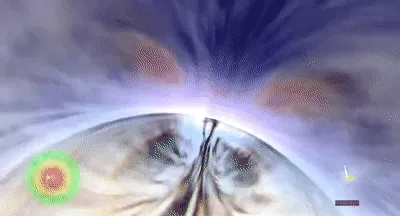Surviving and even being
A new study challenges the entire understanding of physics about cosmic black holes.
It can be interpreted as a space - time with extremely large gravity, enough to twist the light. In other words, any object in the world - including living things - if dropped here will be pressed, torn apart, permanently no longer exists.
At the very least, that's what most physicists in the world agree with. But according to a recent study, there are some types of cosmic black holes that can still help you survive. Only thing, you will fall into a very freaking reality.

The black hole has a tremendous gravitational force, enough to twist the light.
These black holes do not kill you, but will "destroy" what is supposed to be "past" by taking you to something called "parallel universe" . Your life now has too many variables, and therefore the future is infinite.
In our world today, the past will determine the future. That is, for every action we do, it will lead to one and only one future. But according to experts from the University of California, Berkeley (USA), this kind of black hole will push us to another universe, where the laws of physics no longer apply. With it, we can even become "immortal".
Specifically, the study author Peter Hintz - analyzed the electrical interaction data with a type of cosmic black hole, called "Reissner-Nordström-de Sitter". This is a strange black hole that science has not yet been able to determine. Only know that if someone gets into this kind of black hole, they can survive.

With normal black holes, just getting close is ripped apart.
However, the journey is like going through a tunnel, which will bring them into a world that is very indeterminate, unpredictable on the other end. It could be a new universe, where so-called "causal relations" in physics no longer exist. And moreover, a past action can lead to many futures coexisting in a moment.
In fact, this is the phenomenon stated in Albert Einstein's general theory of relativity - the theory used as a foundation for decades to explain gravity.
"Normally, the law of a given condition can be used to determine the problems that will occur in any physical system" - quoted Robert Mann, professor of physics and mathematics at the University of Waterloo, Canada.
"But in Einstein's general theory of relativity there is no mention of this feature."
"Even knowing the whole energy and the distribution of matter in the entire universe, the equation of general relativity does not predict the whole future of space-time."

There is a kind of cosmic black hole that can still help you survive that is the Reissner-Nordström-de Sitter black hole.
It is known that Professor Hintz has studied a kind of non-rotating black hole, which has something called "Cauchy horizon" (Cauchy is the point that every fate will be broken, no longer known future). With Cauchy, no one could observe it, because the light passing through here would be completely annihilated. The time here will also be slower because of the strong gravitational force.
But with the Reissner-Nordström-de Sitter black hole, Professor Hintz thinks this is an exception, through mathematical calculations, not physics.
"No physicist can go into the black hole. This is a mathematical category."
"But in this respect, Einstein's equations are more interesting than ever. Because behind Cauchy Road, nothing is decided."
According to Professor Hintz, the reason for his research could be due to the expansion of the universe with increasing velocity. When space-time is constantly being stretched, the universe on the other side of the black hole is unaffected.
In some cases - as with the Reissner-Nordström-de Sitter black hole, stretched space-time also eliminates the possibility of time expansion in the black hole, helping people to pass through without affecting it. Only the destination is a very uncertain universe.
The study is published in Physical Review Letters.
- Surviving an explosion: It's not as easy as on the movie!
- The secret of surviving the dinosaur's childhood?
- Rapid evolution to adapt to environmental changes
- How does the lamb receive the mother in the crowd?
- The children escape strange death
- The oldest condom in the world
- Photo reporter miraculously survived the tsunami
- The creature returned from the dead after 11 million years
- Spectacular survival cases in the 19th century
- Black-headed bird's ability to withstand cold
- Memory helps elephants to survive the survival war
- Cell sacrifices for the common good
 Van Allen's belt and evidence that the Apollo 11 mission to the Moon was myth
Van Allen's belt and evidence that the Apollo 11 mission to the Moon was myth The levels of civilization in the universe (Kardashev scale)
The levels of civilization in the universe (Kardashev scale) Today Mars, the sun and the Earth are aligned
Today Mars, the sun and the Earth are aligned The Amazon owner announced a secret plan to build a space base for thousands of people
The Amazon owner announced a secret plan to build a space base for thousands of people